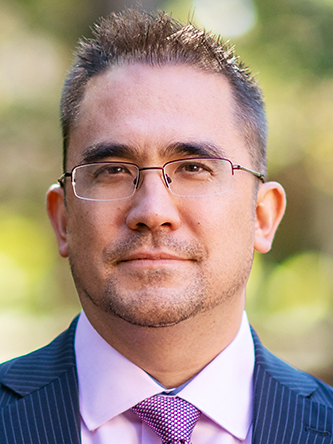The Virginia Center for Tax Law has been established at the University of Virginia School of Law, with Professor Andrew Hayashi serving as the center’s first director.
The center will bring to the fore faculty scholarship in tax law — emphasizing the present conversation while building upon UVA Law’s historical strengths and storied past in tax.
“The center will sponsor events that advance scholarly research on tax law and foster the exchange of ideas and experience between academics, judges, practicing attorneys and government officials,” Hayashi said.

Hayashi is the Class of 1948 Professor of Scholarly Research in Law and an expert in tax law, tax policy and behavioral law and economics. Prior to joining the Law School, he was a fellow at the Furman Center for Real Estate and Urban Policy at New York University, where his research focused on the effects of tax policy on real estate and housing markets. He practiced tax law earlier in his career as an associate at Davis Polk & Wardwell. He holds a doctorate in economics from the University of California, Berkeley.
The center’s faculty include Michael Doran, Joshua Fischman, Kevin A. Kordana, Ruth Mason, Paul B. Stephan ’77 and Ethan Yale.
In addition to their scholarly endeavors, the faculty remain engaged with practice organizations such as the ABA Tax Section, the American Law Institute, Congress, the Treasury Department and the IRS.
“Tax is a wide-ranging area of law, and we are very fortunate to have a faculty that can cover so much of it,” Hayashi said. “My colleagues have diverse interests and topical and methodological expertise. Their scholarship reflects that, and it makes for an exciting intellectual culture.”
Recent papers by UVA Law faculty include “Identifying Illegal Subsidies,” by Mason, forthcoming in the American University Law Review; “Legislative Entrenchment and Federal Fiscal Policy,” by Doran, published in Law and Contemporary Problems; and “Property Taxes During the Pandemic,” co-authored by Hayashi and published in State Tax Notes.
In his paper, Hayashi argues that, despite the pandemic, local governments can still raise property tax revenue while protecting vulnerable taxpayers. He and Mason also recently teamed up as part of a broader coalition of tax scholars calling itself Project SAFE (State Action in Fiscal Emergencies); the effort provides policy recommendations to states in light of the pandemic.
Because of the problems the nation and the world face, the addition of the center comes at a timely moment.
“The United States is right at the center of what seems to be a global reconsideration of fiscal and economic policies, focusing on race, inequality, and the relationship between capital and labor,” Hayashi said. “Tax law, policy and administration are at the core of this conversation.”
The center will engage with other UVA faculty members producing related work on Grounds. They include Jeri K. Seidman of the McIntire School of Commerce, Mary Margaret Frank and Justin J. Hopkins of the Darden School of Business, and Leora Friedberg of the Department of Economics.
“These scholars do research on tax law and policy, they participate in events at the Law School, and they co-author with Law School faculty,” he said. “We’re fortunate to have such talented colleagues in other departments.”
UVA’s strength in tax owes a considerable debt to the past, Hayashi said.
The late alumni Mortimer Caplin ’40, former IRS commissioner, and Edwin S. Cohen ’36, a former undersecretary of the Treasury, are among the Law School’s storied government servants who taught at the Law School. Professors Emeriti George Yin, Mildred Robinson and Thomas R. White III have also been exemplars, Hayashi said. The trio have served in influential volunteer and public service roles. Yin served as chief of staff of the U.S. Congress’ Joint Committee on Taxation, one of the most influential tax positions in the country.
And, of course, countless alumni who weren’t academics have served in senior positions in government and private practice.
“These are people who are responsible for the distinguished history of tax scholarship and service at UVA,” Hayashi said.
Virginia offers one of the strongest tax law curricula in the country, including courses in corporate, partnership and international tax; tax policy; taxation of private equity; gratuitous transfers; nonprofits; and employee benefits, among many others. The Law School is home to the Virginia Tax Review, the nation’s leading student-edited tax journal. In addition to their work in the classroom and on the journal, students have won the International and European Tax Moot Court competition three times in a row, and fielded the first U.S. team to win the event.
Faculty, students and alumni also learn about cutting-edge issues in tax from the Virginia Tax Study Group, an annual tradition at the Law School that brings together alumni from private practice, government and academia. In the fall, the annual UVA Invitational Tax Conference brings leading tax academics to Grounds to discuss scholarly works in progress. Students are invited to attend both meetings. During the summer, the Law School hosts the Virginia Conference on Federal Taxation, an annual conference that marked its 70th anniversary in 2018.
Related Stories
Founded in 1819, the University of Virginia School of Law is the second-oldest continuously operating law school in the nation. Consistently ranked among the top law schools, Virginia is a world-renowned training ground for distinguished lawyers and public servants, instilling in them a commitment to leadership, integrity and community service.


